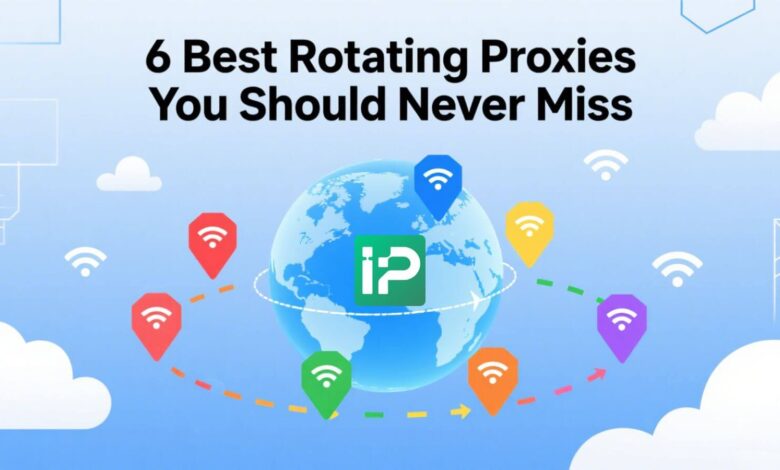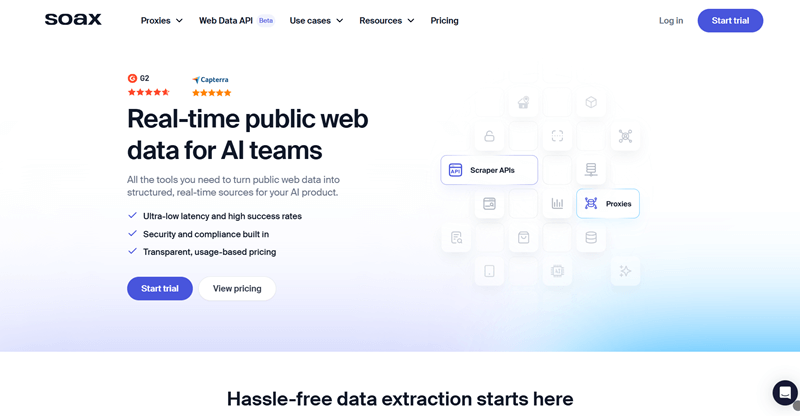6 Best Rotating Proxies You Should Never Miss in 2025

Facing IP blocks during online research, shopping, or data collection disrupts your workflow. When websites detect repeated requests from a single IP address, they often restrict access. This is where rotating proxy services become relevant. By automatically switching your IP address at set intervals or per request, they help you appear as different, legitimate users, potentially reducing blocks.
However, with numerous providers available, selecting the right rotating proxy service can feel overwhelming. There are so many factors you need to think about, such as reliability, speed, and cost. How do you identify truly trustworthy providers among the many claiming to offer the best rotating proxies? This guide will get you covered by showing the pros and cons of different providers to help you select the most suitable one.
What Is IP Rotation
IP rotation refers to the automatic process of changing your device’s public IP address at regular intervals or after specific actions. Imagine your Internet connection wearing different disguises: Each time you connect, you get a new identity. This happens seamlessly in the background. IP rotation helps prevent websites from flagging your activity as suspicious. By constantly rotating IP addresses, you appear less predictable, making it easier to access websites freely.
What Is a Rotating Proxy
A rotating proxy is a specialized gateway that automatically assigns you a new IP address from a large pool at predefined intervals or after each connection request. Unlike static proxies, which keep the same IP for extended periods, a rotating proxy dynamically changes your visible IP. This constant IP rotation happens server-side: the proxy network assigns a different IP from its inventory each time you connect or based on your chosen timing rules (e.g., every request or every 10 minutes).
Many services use rotating residential proxies, which source IPs from real home devices or ISPs. This mimics organic user behavior more convincingly than datacenter IPs. Simply put, the core function of rotating proxies is to distribute your activity across many IPs, thus reducing the chance of blocks or captchas.
The proxy service market has stratified into distinct tiers, each catering to different business needs and budgets – from Proxy-Cheap solutions suitable for basic tasks to premium offerings like static residential proxies that support more demanding and stable operations. Understanding these tiers helps organizations make informed decisions based on their requirements, scale of operations, and available resources. When evaluating providers, consider not just the current needs but also future scalability requirements.
Factors You Should Consider When Selecting Rotating Proxies
Choosing the best rotating proxies service requires careful evaluation. Not all providers deliver equal performance or reliability. Here are key aspects to examine before you buy rotating proxies:
- IP Pool Size & Geographic Coverage: A larger pool offers more diverse IPs, lowering the risk of overuse detection. Look for providers with millions of IPs spanning numerous countries and cities. Wide coverage ensures you can target specific locations effectively.
- Rotation Control & Sticky Sessions: Flexibility is crucial. Can you set the IP rotation frequency (e.g., per request, per minute)? Does the service support sticky sessions, allowing a single IP to persist for tasks needing continuity? Some even allow sessions up to 24 hours, like IPcook.
- Anonymity Level: Ensure the proxies provide elite anonymity. This means no leakage of proxy headers, such as Via or X-Forwarded-For, and IPs appearing as genuine residential connections. Verifiable high anonymity prevents websites from identifying proxy use.
- Speed and Concurrency: Slow proxies hinder tasks. So, check the provider’s average response times and whether they meet your speed needs. Also, confirm the number of concurrent connections allowed, since high concurrency is vital for large-scale operations.
- Costs for Subscription: When selecting a service, costs are usually an important factor, especially for budget-tight users. Look for services that offer quality rotating proxies at low prices. To do that, remember to compare the pricing plans of different providers.
Best Rotating Proxies Services for Changing IP Addresses
Based on critical factors like IP pool quality, rotation flexibility, and performance, several reputable providers stand out. Below, we compare six leading rotating proxy services suitable for diverse needs. This overview helps you evaluate options before deciding where to buy rotating proxies for reliable IP rotation.
Top 1. IPcook – Best Rotating Proxy Service for All
User Rating: 4.8/5
IPcook operates a global rotating proxy network leveraging over 55 million residential IPs across 185+ countries and cities. All IPs originate from real user devices, ensuring high legitimacy for sensitive tasks like ad verification or localized data scraping. This positions it among the best rotating residential proxies with genuine user footprints.
The service offers precise control over IP rotation, which allows users to configure automatic IP changes per request, by minute intervals, or through sticky sessions lasting up to 24 hours. It maintains elite anonymity by stripping proxy-related headers, verified by third-party tools. Performance includes average response times under 0.5 seconds globally and support for up to 100,000 concurrent connections. Integration is streamlined via simple API access and compatibility with frameworks like Scrapy and Puppeteer.
Pros:
- 55M+ real residential IPs across 185+ locations for IP rotation
- Granular IP rotation control per request/time and 24h sticky sessions
- Elite anonymity with no proxy header leakage for privacy
- High-speed connections (<0.5s avg) with up to 100k concurrency
Cons:
- Browser extension currently in development
- Limited pricing models available

Top 2. Bright Data – Customized APIs for Automatic IP Rotation
User Rating: 4.7/5
Bright Data (formerly Luminati) is a globally recognized proxy service provider headquartered in Israel, offering extensive IP resources since 2014. Its network spans over 195 countries with more than 150 million IPs, including rotating residential proxies, static residential IPs, datacenter proxies, and mobile IPs. All these IPs are sourced from real residential and ISP networks.
The platform provides enterprise-level tools such as Web Scraper IDE, SERP APIs, and automated data collectors, enabling users to bypass CAPTCHAs, geo-restrictions, and anti-bot mechanisms with minimal code. Bright Data emphasizes compliance with GDPR/CCPA regulations and supports custom IP rotation settings, though its interface may require technical expertise.
Pros:
- 150M+ global IP pool with 195+ country coverage
- Advanced tools for automation (Web Unlocker, SERP APIs)
- Strong compliance (GDPR/CCPA) and security protocols
Cons:
- Higher pricing tiers, less budget-friendly
- Steeper learning curve for beginners
- Occasional IP instability reported

Top 3. SOAX – IP Rotation for Market Research
User Rating: 4.6/5
SOAX is a UK-based proxy provider founded in 2019, specializing in rotating residential proxies, mobile proxies, and ISP proxies. Its network spans 195 countries with a pool of over 155 million IPs sourced from real residential devices and mobile networks, suitable for tasks like data scraping and market research. The service supports granular geo-targeting, which lets users select IPs by country, city, or specific ISP.
SOAX offers flexible IP rotation options, including automatic IP changes per request or customizable sticky sessions of up to 60 minutes. Protocols include HTTP(S) and SOCKS5, compatible with tools like Scrapy. Users can manage proxies via an API or dashboard, though browser extensions are not available.
Pros:
- 155M+ residential IPs across 195+ countries with city/ISP-level targeting
- Flexible IP rotation (per request) and adjustable sticky sessions (90s-60min)
- Supports HTTP(S)/SOCKS5 protocols and Scrapy integration
Cons:
- Slower average response times than competitors
- Higher entry-level pricing for residential proxies
- No browser extension support

Top 4. Infatica – Fast Rotating Proxies for Real-Time Operations
User Rating: 4.4/5
Infatica is a proxy provider founded in 2019, specializing in rotating residential proxies, static ISP proxies, mobile proxies, and datacenter IPs. Its network spans over 150 countries with a pool of more than 15 million IPs sourced from real residential devices and ISP networks. This extensive coverage enables precise geo-targeting at the country, city, or state level, suitable for tasks like ad verification, localized data scraping, and market research.
The service supports customizable IP rotation, allowing users to switch IPs per request or set timed rotations between 5 to 60 minutes. Besides, it offers unlimited concurrent connections with fast average response times (0.35 seconds). Integration with apps and tools is streamlined via HTTP/SOCKS5 protocols.
Pros:
- 15M+ real residential IPs across 150+ locations
- Fast response times (0.35s avg) with unlimited concurrency
- Flexible IP rotation (per request/5-60min intervals)
Cons:
- Smaller IP pool vs. top competitors
- Limited protocol support (HTTP/SOCKS5 only)
- Instability in performance and low uptime

Top 5. FloppyData – Affordable Rotating Residential Proxies
User Rating: 4.4/5
FloppyData is a proxy service offering rotating residential proxies, mobile proxies, and datacenter IPs across 195+ global locations. Its network comprises over 65 million IPs sourced from real residential devices, targeting use cases like social media management or data scraping. Pricing starts at $2.95/GB for residential/mobile proxies and $0.90/GB for datacenter IPs, with discounts for high-volume usage.
The service emphasizes automated IP rotation with low latency and supports HTTP/SOCKS5 protocols. A Chrome extension is available to simplify proxy integration for browser-based workflows. What’s more, FloppyData reports high success rates for bypassing detection systems and offers 99.99% uptime guarantees.
Pros:
- 65M+ IPs across 195+ locations
- Competitive entry pricing ($2.95/GB)
- Chrome extension for browser workflows
Cons:
- Limited advanced automation features
- Low anonymity grade for sensitive tasks
- Less enterprise-level support

Top 6. MarsProxies – Best Rotating Proxies for Small Projects
User Rating: 4.3/5
MarsProxies is a proxy service provider offering rotating residential proxies, ISP proxies, datacenter IPs, and specialized sneaker proxies. Its network spans 195+ countries with over 1 million IPs sourced from real residential devices and ISPs, focusing on flexible use cases like price monitoring and e-commerce automation. Pricing starts at $4.99/GB for residential proxies, with volume discounts reducing costs to $3.49/GB for large orders.
The service supports HTTP(S)/SOCKS5 protocols and customizable IP rotation. Other key features include non-expiring residential bandwidth, city/state-level geo-targeting, and integration tools like a Chrome extension for easier access. MarsProxies targets small-to-medium projects with transparent pricing but lacks APIs for operations at the enterprise scale.
Pros:
- Diverse proxy types (residential, ISP, datacenter, sneaker) with flexible plans
- Cost-effective pricing from $4.99/GB (volume discounts available)
- Non-expiring bandwidth and browser extensions (Chrome/Firefox)
Cons:
- Smaller IP pool (about 1M IPs), limiting large-scale operations
- Lacks enterprise APIs for advanced automation
- No free trial or refund policy

How Rotating Proxies Assist Your Tasks
Understanding what rotating proxies do is only half the picture. Their real value emerges in practical scenarios where IP rotation solves specific challenges. Here’s how they enhance key workflows:
- Web Scraping & Data Collection
When gathering data at scale, rotating residential proxies prevent IP bans by distributing requests across thousands of addresses. They mimic organic traffic patterns and allow continuous extraction from e-commerce sites, travel platforms, or directories without triggering anti-bot systems.
- Ad Verification & Competitive Research
You can verify ads or monitor competitors across locations by rotating IP addresses per check. This reveals geo-targeted content, pricing variations, or localized campaigns accurately, as sites display authentic user experiences.
- SEO Monitoring & SERP Tracking
Search engines personalize results based on location and history. Rotating proxies enable neutral rank tracking by resetting your digital footprint with each new IP. Providers with IPs covering numerous regions will allow you to access localized results as you wish.
- Limited-Edition Purchases
For high-demand drops, manually switching IPs is impractical. Automated IP rotation lets you submit multiple requests simultaneously through different addresses and thus bypass purchase limits per household or region.
Summary
In this guide, I have introduced the 6 best rotating proxies services in the market that can automatically switch your IP address to prevent blocks during repetitive online tasks. When choosing a proxy, consider key factors like IP pool size, geographic coverage, rotation control, and speed.
Among providers compared, IPcook stands out for its large network of 55M+ real residential IPs across 185+ locations, granular IP rotation settings (per-request/minute-based), and high anonymity. Alternatives like Bright Data and SOAX offer different strengths in scale or pricing.
But ultimately, the best rotating proxies service depends on your specific needs, whether scraping data, verifying ads, or tracking SEO. Before making the final decision, evaluate providers based on your required locations, budget, and technical demands.




